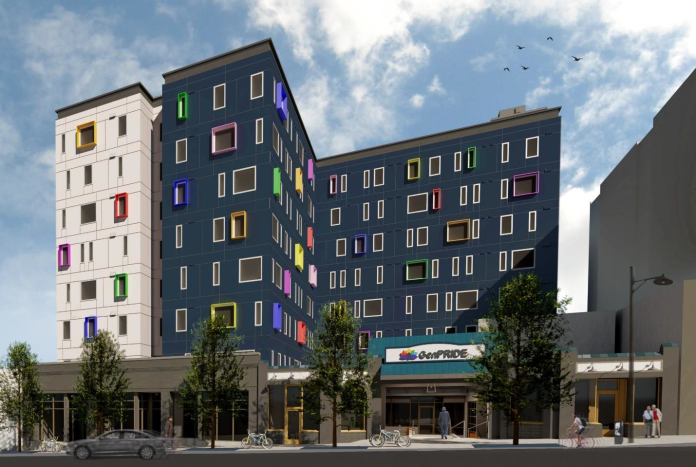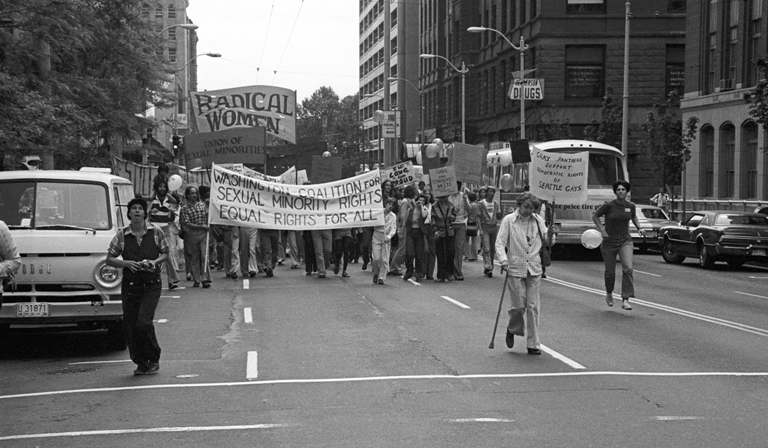The building will provide affordable LGBTQ+ affirming housing, health services, and community support to seniors.
Today GenPride and Community Roots Housing break ground on Pride Place, a 118-unit LGBTQ+ affirming affordable housing development for seniors on the 1500 block of Broadway Avenue in Capitol Hill. The seven story building will include a 4,400 square foot senior community and health services center, as well as 3,800 square feet of commercial retail space on the street level. It is the first LGBTQ+ affirming housing to be built in Washington State.
“This groundbreaking represents an enormous milestone for the local LGBTQ+ community,” said Steven Knipp, executive director of GenPride, in a press release. “It is the culmination of nearly a decade of hard work by people who recognized the need to support our elders who fought and won the rights we enjoy today, as well as create a place for generations to come.”
GenPride is a nonprofit that “empowers older LGBTQ+ adults to live with pride and dignity by promoting, connecting and developing innovative programs and services.” Its partner organization in developing Pride Place, Community Roots Housing (formerly named Capitol Hill Housing) is one of the largest affordable housing providers in Seattle. The organizations owns nearly 50 affordable apartment buildings in Seattle and White Center that house over 2,000 residents.
Data shows that affordable housing developments like Pride Place are much needed. According SAGE, a nonprofit that advocates for and supports LGBTQ+ seniors, over 2.7 million people age 50 and up in the United States identify as LGBTQ+, a number that is growing each year and is expected to top 5 million by 2030.
Despite growing recognition in American society, many LGBTQ+ seniors continue to face discrimination. In a study completed by SAGE, 48% of LGBTQ+ seniors have cited having experienced at least one form of rental housing discrimination, more than half live in a state with no housing discrimination protections for LGBTQ+ people, and over a third expressed fears about having to re-closet themselves when entering senior housing. Additionally, a report from the Kaiser Family Foundation found that LGBTQ+ seniors disproportionately face challenges in accessing medical care, and as a result were more likely to suffer from chronic health conditions and earlier onset of disabilities than seniors who did not identify as LGBTQ+.
Approximately 20% of LGBTQ+ seniors also identify as people of color. Aging With Pride: National Health, Aging and Sexuality/Gender Study, the first federally funded longitudinal study of LGBTQ+ seniors, found that people of color faced additional challenges and barriers.
“African-Americans reported the highest levels of lifetime LGBTQ-related discrimination, and both African-Americans and Hispanics reported lower levels of household income, education, affirmation of their identities and social support compared to non-Hispanic white LGBTQ older adults,” said Dr. Karen Fredriksen-Goldsen, lead researcher in the study in article published by GenPride.

While housing for LGBTQ+ seniors is on the rise across the country in recent years, unmet demand exists, especially for affordable housing. Research completed by SAGE found that nearly one-third of LGBTQ+ seniors age 65 and older live at or below 200% of the federal poverty level, a rate about 20% higher than seniors who did not identify as members of the LGBTQ+ community. Black LGBTQ seniors have the highest rates of poverty with 40% living at or below 200% of the federal poverty level.
Rents at Pride Place will be affordable to households earning 30% to 60% of area median income (AMI). In the case of a one-person household, this means an income range of approximately $24,300 to $48,600, or $27,800 to $72,400 for a two-person household.
Access to affordable housing will certainly allow for LGBTQ+ people who could otherwise not afford Capitol Hill’s steep housing prices to access to community and culturally competent care. In 2021, RENTcafé estimates average rental prices range from $1,800 for studio to $4,000 for a three bedroom apartment in Capitol Hill, while according to Redfin, the median cost of buying a home in Capitol Hill is $650,000 — prices are typically lower for condos than single family dwellings.
The building site for Pride Place was acquired in collaboration with Sound Transit and Seattle Central College, while its $52 million budget was funded through a variety of public and private investments, including low-income state and federal tax credits. GenPride has already raised $2.7 million in private funding toward the total $4.7 million goal to support the ground floor senior center; however, active fundraising is ongoing to cover the remaining $2 million balance.
Recognizing LGBTQ+ history, culture, and community
Pioneer Square may have been the first neighborhood in Seattle to be associated with the city’s LGBTQ community, but Capitol Hill’s history as a gayborhood goes all the way back to the years following World War II. In 1969, Seattle’s Dorian Society established a house on Capitol Hill which “served as a de facto gay community center” by providing counseling services and employment help. It was seen as the first of its kind in the country.
As the Gay Liberation movement gained in prominence in the 1970s, a younger generation of mostly White gay men established businesses and organizations into Capitol Hill as many residents left for new housing being built in the suburbs. The infamous Boeing Bust also lowered housing costs and opening up opportunities for a growth of gay cultural expression. Over time, the LGBTQ+ in Capitol Hill community grew in size and diversity of identities. Wildrose, Seattle’s only lesbian bar, has been operating in Capitol Hill since 1984. The neighborhood is also home to Ingersoll Gender Center, one of the oldest organizations in the U.S. to support the transgender and gender nonconforming communities.
While the 2020 Census revealed that over 10% of Seattle’s adult residents identify as LGBTQ+, a percentage on par with San Francisco, fewer LGBTQ+ community members are living in Capitol Hill than in the past. This demographic shift and the feeling that neighborhood is less of safe space for the queer community has led some people to question if rapid growth has begun to erode Capitol Hill’s identity as the center for LGBTQ+ life in the city.
Professor Manish Chalana, who teaches urban planning and historic preservation at the University of Washington, was circumspective about the changes that have come to Capitol Hill in an interview about his research on how new development has altered the neighborhood. “The fact that gay people can move anywhere is a great sign of progress,” Chalana said, “But gay neighborhoods are still relevant, still needed. They are important for community-building, and for people to have support systems, especially for people who come from places where they weren’t supported, or who aren’t comfortable being out.”
After Pride Place enters into construction, the next step will be to ensure that the seniors who would benefit most from living there are encouraged to apply.
“That’s one of the next huge steps in this movement and in this work: who are we reaching and who are we leaving out? We still have a lot of work there … we can build an affordable building but if we’re not reaching deeply vulnerable people … that’s a problem,” said Sydney Kopp-Richardson, the director of SAGE’s National LGBT Elder Housing Initiative, in an article for Shelterforce.
The City of Seattle employs affirmative marketing (targeted outreach on affordable housing openings to community nonprofits) as part of its community preference program, which is intended make publicly funded affordable housing available Seattle residents at risk of displacement. In the case of Pride Place, while it cannot restrict leasing to seniors who identify as LGBTQ+ because of Federal Fair Housing law, affirmative marketing to nonprofits like GenPride will spread the word about openings at Pride Place among LGBTQ+ seniors who meet its income requirements.
Community Roots Housing expects to open the building to residents in 2023.
“The $44.1 million Pride Place project including the estimated $4.2 million GenPride community space is being funded through a mix of $12.6 million in public funds, $13.5 million in Low-Income Housing Tax Credit bonding, a $9.4 million loan, $2.1 million in equity from developer Community Roots Housing,” the Capitol Hill Seattle Blog reported. “An additional $2.5 million is being raised by organizations to complete the project.”
Natalie Bicknell Argerious (she/her) is a reporter and podcast host at The Urbanist. She previously served as managing editor. A passionate urban explorer since childhood, she loves learning how to make cities more inclusive, vibrant, and environmentally resilient. You can often find her wandering around Seattle's Central District and Capitol Hill with her dogs and cat. Email her at natalie [at] theurbanist [dot] org.




